Chuy's Bundle
Who Truly Owns Chuy's Now?
Ever wondered about the forces steering your favorite Tex-Mex spot? Unraveling the Chuy's SWOT Analysis and its ownership structure is key to understanding its future. From its quirky beginnings to its current status, the story of Chuy's ownership is a fascinating journey of growth and strategic shifts.
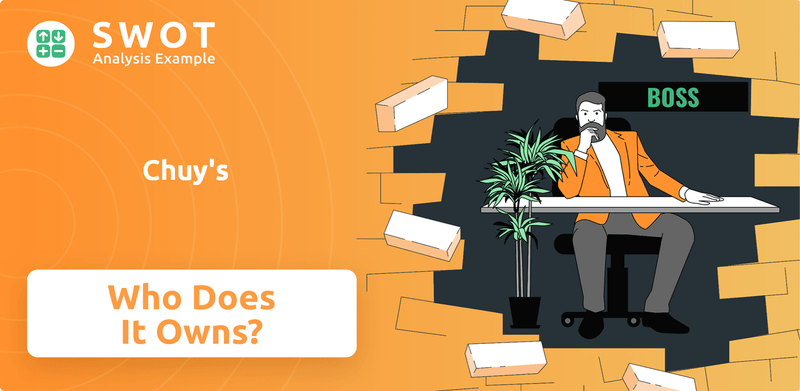
The tale of Chuy's restaurant ownership is one of significant transformation. Initially a privately held venture, understanding Chuy's history and the evolution of its stakeholders is crucial. This exploration will illuminate the pivotal acquisition that reshaped the company's destiny, impacting its operational strategies and financial performance. Discover the answers to questions like "Who owns Chuy's?" and explore the details of Chuy's financials.
Who Founded Chuy's?
The story of Chuy's restaurant began on April 16, 1982, in Austin, Texas. Mike Young and John Zapp, the founders, envisioned a unique Tex-Mex dining experience. They focused on fresh ingredients and a distinctive atmosphere to set their restaurant apart.
Initially, Young and Zapp were the sole owners, shaping the company's culture and driving its early growth. While the precise initial equity split isn't publicly available, their influence was paramount. Their vision laid the foundation for what Chuy's would become.
The early years saw the establishment of the brand and its core values. The founders' commitment to quality and a unique dining experience helped build a loyal customer base. This foundation was critical as the company looked toward expansion and future investment.
In November 2006, Goode Partners LLC, a private equity firm based in New York, made a significant investment in Chuy's. This move led to the incorporation of Chuy's Holdings, Inc. in Delaware. The investment, along with debt financing, aimed to support the company's expansion plans.
- Goode Partners, through its affiliate Goode Chuy's Holdings, LLC, became the controlling stockholder.
- As of March 25, 2013, Goode Chuy's Holdings and its affiliates held approximately 22.7% of the outstanding common stock.
- MY/ZP Equity LP, controlled by the founders, retained approximately 2.6% ownership.
- This shift marked a transition from founder-led ownership to a structure involving private equity.
Chuy's SWOT Analysis
- Complete SWOT Breakdown
- Fully Customizable
- Editable in Excel & Word
- Professional Formatting
- Investor-Ready Format
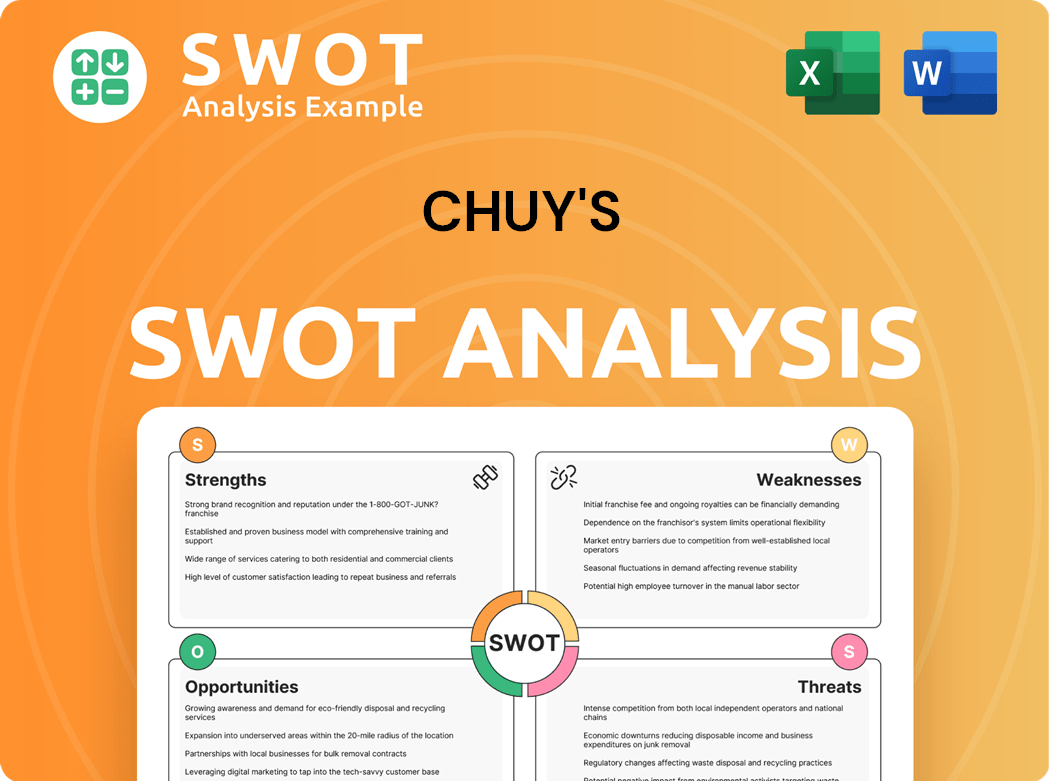
How Has Chuy's’s Ownership Changed Over Time?
The ownership of the restaurant chain, has seen significant changes over time. Initially, the company was privately held. A major turning point came on July 24, 2012, when it went public with an IPO that raised $75.8 million. At that point, the company had 36 locations across 7 states. This IPO introduced public shareholders into the ownership structure of the company.
Before the acquisition, the company had 86 institutional owners who had filed forms with the SEC. These owners held a total of 2,268,328 shares. Key institutional shareholders included iShares Core S&P Small-Cap ETF (IJR), Vanguard Total Stock Market Index Fund Investor Shares (VTSMX), and iShares Russell 2000 ETF (IWM). The evolution of the company's ownership is a key part of understanding its history and current status.
| Event | Date | Impact |
|---|---|---|
| Initial Public Offering (IPO) | July 24, 2012 | Introduced public shareholders; company operated 36 locations. |
| Acquisition by Darden Restaurants, Inc. | October 11, 2024 | Made the company an indirect, wholly-owned subsidiary of Darden; delisted from Nasdaq. |
| Stockholder Approval for Acquisition | October 10, 2024 | Stockholders approved the acquisition by Darden Restaurants, Inc. |
A pivotal moment in the company's history occurred on October 11, 2024, when Darden Restaurants, Inc. acquired it for approximately $605 million in an all-cash transaction. This acquisition, approved by the company's stockholders on October 10, 2024, resulted in the company becoming an indirect, wholly-owned subsidiary of Darden. This deal led to the delisting of the company's common stock from Nasdaq and deregistration under the Securities Exchange Act of 1934. Shareholders received $37.50 per share in cash. This shift significantly altered the company's governance and strategy, integrating it into Darden's broader portfolio. For more insights, you can read about the Growth Strategy of Chuy's.
The company's ownership has transitioned from private to public and then to acquisition by Darden Restaurants.
- The IPO in 2012 brought in public shareholders.
- Darden's acquisition in 2024 made it a subsidiary.
- Shareholders received $37.50 per share in the acquisition.
- The company's financials and strategic direction are now influenced by Darden.
Chuy's PESTLE Analysis
- Covers All 6 PESTLE Categories
- No Research Needed – Save Hours of Work
- Built by Experts, Trusted by Consultants
- Instant Download, Ready to Use
- 100% Editable, Fully Customizable
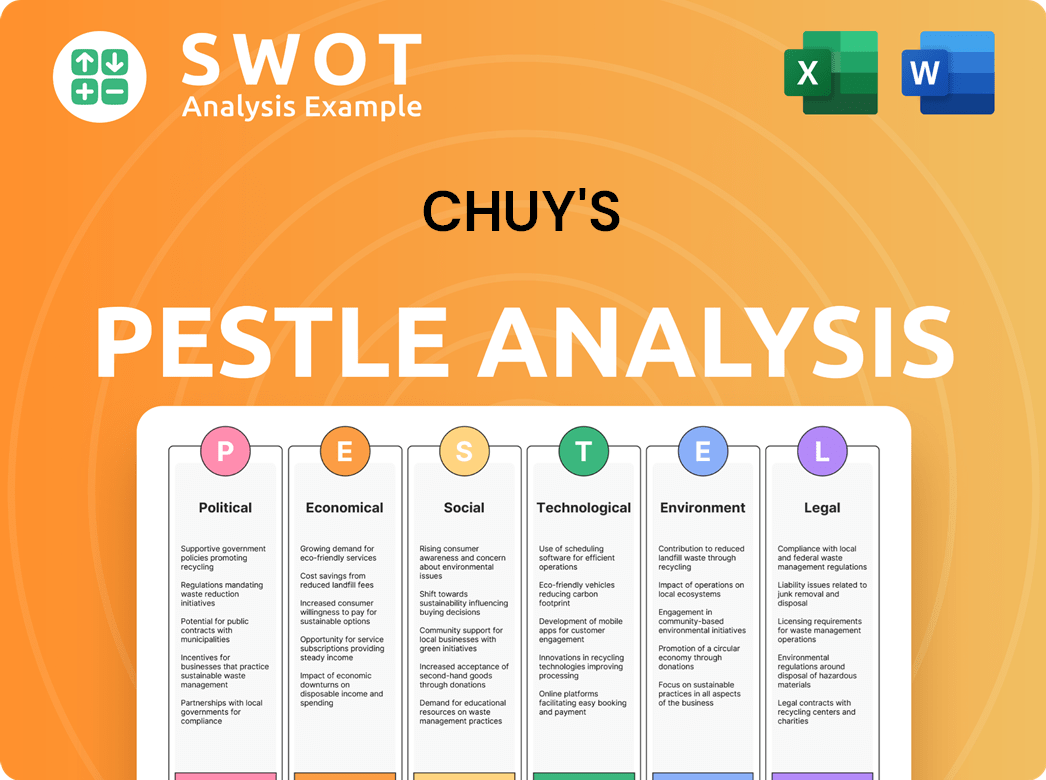
Who Sits on Chuy's’s Board?
Before the acquisition, the Board of Directors of the restaurant chain played a critical role in its governance. Co-founders Michael Young and John Zapp served as Co-Chairmen of the Board of Directors, appointed in October 2013. This followed the resignation of board members representing Goode Partners LLC, which had made a majority investment in the company in 2006. This shift aimed to align board leadership with the founders' vision after the company's IPO.
However, the landscape changed significantly with the merger with Darden Restaurants on October 11, 2024. The former board of directors of the restaurant ceased their roles. Anthony G. Morrow, previously the sole director of the merger subsidiary, became the sole director of the restaurant. This means that decision-making power and voting control now reside within Darden Restaurants, Inc., as the restaurant operates as a wholly-owned subsidiary. The voting structure for the restaurant's shareholders became irrelevant upon the merger's completion, as their shares were converted into cash. Understanding the current ownership structure is key to understanding the Revenue Streams & Business Model of Chuy's.
| Key Aspect | Details | Impact |
|---|---|---|
| Board of Directors | Previously, the board included co-founders and representatives from investment firms. | Ensured alignment with founders' vision and investor interests before the merger. |
| Post-Merger Governance | Anthony G. Morrow is now the sole director. | Consolidates decision-making under Darden Restaurants, Inc. |
| Shareholder Voting | Shareholder voting rights ceased upon the merger. | Reflects the transition to a wholly-owned subsidiary. |
The restaurant's ownership structure has fundamentally changed. The acquisition by Darden Restaurants, Inc. has made it a wholly-owned subsidiary. This shift impacts how decisions are made and how the company operates.
- Darden Restaurants, Inc. now holds all decision-making power.
- Shareholder voting rights are no longer applicable.
- The company's financials are now consolidated within Darden's reports.
- The company's history includes a transition from private equity ownership to public trading and now, to a wholly-owned subsidiary.
Chuy's Business Model Canvas
- Complete 9-Block Business Model Canvas
- Effortlessly Communicate Your Business Strategy
- Investor-Ready BMC Format
- 100% Editable and Customizable
- Clear and Structured Layout
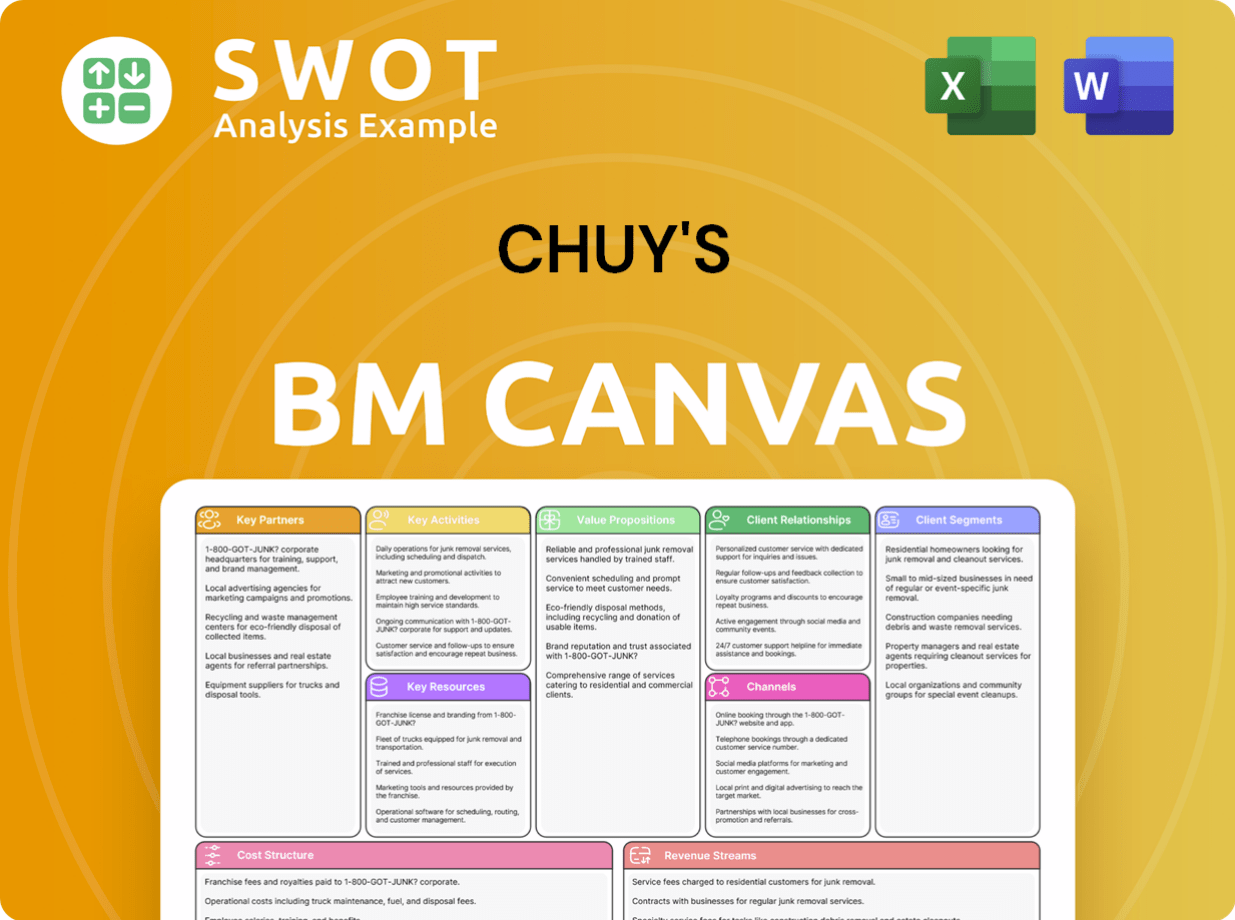
What Recent Changes Have Shaped Chuy's’s Ownership Landscape?
The most significant recent development in the ownership of Chuy's restaurant is its acquisition by Darden Restaurants, Inc. This all-cash transaction, valued at approximately $605 million, was finalized on October 11, 2024. The merger agreement was initially announced on July 17, 2024, and received approval from Chuy's stockholders on October 10, 2024. As a result, Chuy's Holdings, Inc. is no longer a publicly traded company; its common stock was delisted from the Nasdaq Global Select Market.
This acquisition reflects a broader trend of consolidation within the restaurant sector. Darden financed the acquisition through proceeds from senior note offerings. The acquisition is expected to be neutral to Darden's diluted net earnings per share for its fiscal 2025, excluding acquisition and integration-related expenses, and accretive by approximately 12 to 15 cents in its fiscal 2027. Chuy's will now benefit from Darden's resources, potentially leading to further growth. For the first quarter of 2024, prior to the acquisition, Chuy's Holdings reported revenues of $110.5 million. As of March 31, 2024, Chuy's had 102 restaurants.
The acquisition of Chuy's by Darden Restaurants has fundamentally changed the ownership structure. The move aligns with industry trends where larger entities acquire successful brands to expand their portfolios. For insights into how the company has grown over time, you can read more about the Growth Strategy of Chuy's.
Darden Restaurants' acquisition of Chuy's marked a significant change in ownership. The deal, valued at $605 million, was completed in October 2024. This strategic move expanded Darden's portfolio.
Darden expects the acquisition to be neutral to its earnings per share in fiscal 2025. It is anticipated to be accretive by 12 to 15 cents in fiscal 2027. Chuy's reported $110.5 million in revenue in the first quarter of 2024.
As of March 31, 2024, Chuy's had 102 restaurants. The company opened a new restaurant in New Braunfels, TX, during the first quarter of 2024. The acquisition by Darden could accelerate expansion.
The acquisition reflects a broader trend of consolidation in the restaurant industry. Larger companies like Darden are acquiring brands to diversify their offerings. This strategy enhances market reach.
Chuy's Porter's Five Forces Analysis
- Covers All 5 Competitive Forces in Detail
- Structured for Consultants, Students, and Founders
- 100% Editable in Microsoft Word & Excel
- Instant Digital Download – Use Immediately
- Compatible with Mac & PC – Fully Unlocked
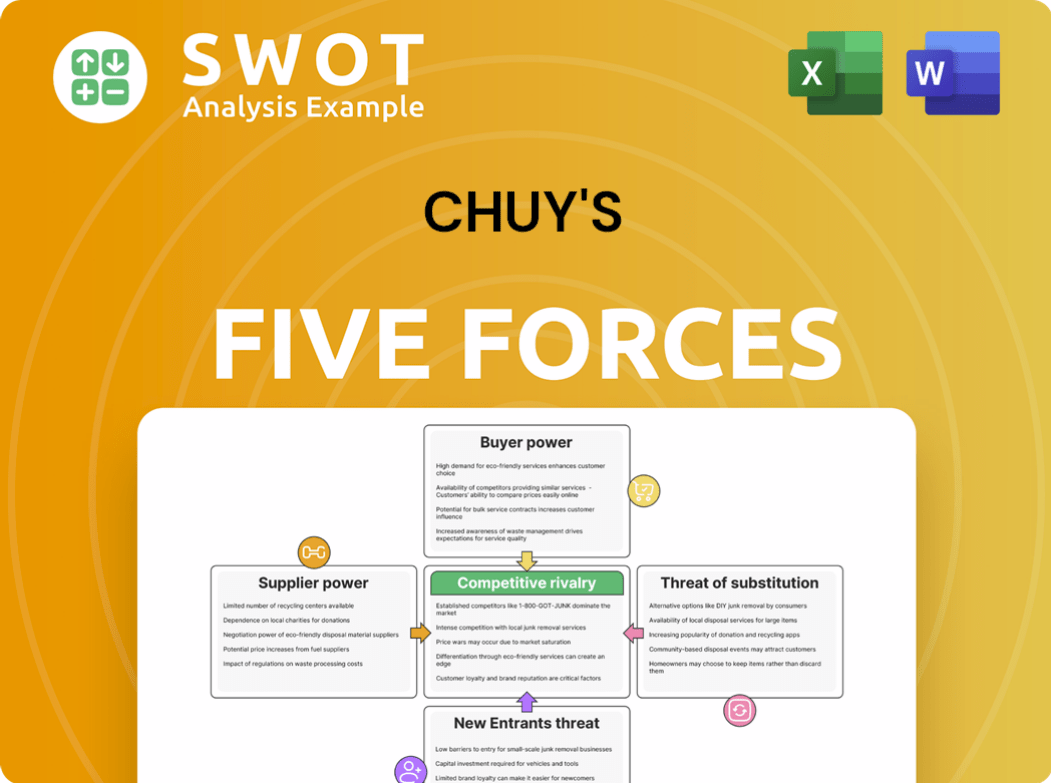
Related Blogs
- What are Mission Vision & Core Values of Chuy's Company?
- What is Competitive Landscape of Chuy's Company?
- What is Growth Strategy and Future Prospects of Chuy's Company?
- How Does Chuy's Company Work?
- What is Sales and Marketing Strategy of Chuy's Company?
- What is Brief History of Chuy's Company?
- What is Customer Demographics and Target Market of Chuy's Company?
Disclaimer
All information, articles, and product details provided on this website are for general informational and educational purposes only. We do not claim any ownership over, nor do we intend to infringe upon, any trademarks, copyrights, logos, brand names, or other intellectual property mentioned or depicted on this site. Such intellectual property remains the property of its respective owners, and any references here are made solely for identification or informational purposes, without implying any affiliation, endorsement, or partnership.
We make no representations or warranties, express or implied, regarding the accuracy, completeness, or suitability of any content or products presented. Nothing on this website should be construed as legal, tax, investment, financial, medical, or other professional advice. In addition, no part of this site—including articles or product references—constitutes a solicitation, recommendation, endorsement, advertisement, or offer to buy or sell any securities, franchises, or other financial instruments, particularly in jurisdictions where such activity would be unlawful.
All content is of a general nature and may not address the specific circumstances of any individual or entity. It is not a substitute for professional advice or services. Any actions you take based on the information provided here are strictly at your own risk. You accept full responsibility for any decisions or outcomes arising from your use of this website and agree to release us from any liability in connection with your use of, or reliance upon, the content or products found herein.